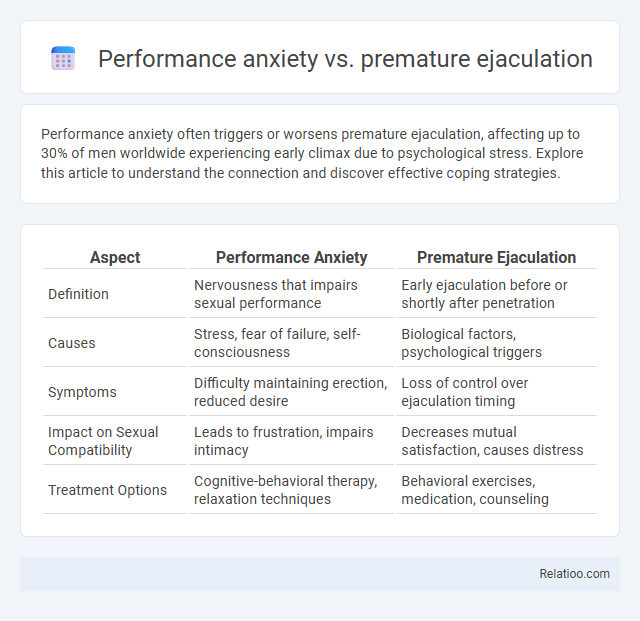Performance anxiety often triggers or worsens premature ejaculation, affecting up to 30% of men worldwide experiencing early climax due to psychological stress. Explore this article to understand the connection and discover effective coping strategies.
Table of Comparison
| Aspect | Performance Anxiety | Premature Ejaculation |
|---|---|---|
| Definition | Nervousness that impairs sexual performance | Early ejaculation before or shortly after penetration |
| Causes | Stress, fear of failure, self-consciousness | Biological factors, psychological triggers |
| Symptoms | Difficulty maintaining erection, reduced desire | Loss of control over ejaculation timing |
| Impact on Sexual Compatibility | Leads to frustration, impairs intimacy | Decreases mutual satisfaction, causes distress |
| Treatment Options | Cognitive-behavioral therapy, relaxation techniques | Behavioral exercises, medication, counseling |
Understanding Performance Anxiety and Premature Ejaculation
Performance anxiety and premature ejaculation are closely linked conditions that impact sexual performance and satisfaction. Understanding performance anxiety involves recognizing the psychological stress and fear of sexual failure that can trigger or worsen premature ejaculation, creating a cycle of anxiety and loss of control during intercourse. You can manage these issues effectively by addressing both the mental and physical factors through techniques like cognitive-behavioral therapy, relaxation exercises, and medical interventions tailored to your specific needs.
Key Differences Between Performance Anxiety and Premature Ejaculation
Performance anxiety primarily involves psychological stress or fear that impacts sexual performance, often leading to difficulty in maintaining an erection, while premature ejaculation is a physiological condition characterized by ejaculation occurring sooner than desired, typically within one minute of penetration. Performance anxiety is triggered by mental factors such as stress, self-esteem issues, or relationship problems, whereas premature ejaculation is linked to neurobiological factors, including hypersensitivity or neurotransmitter imbalances. Understanding these key differences is essential for targeting treatment approaches, with performance anxiety benefiting from psychological interventions and premature ejaculation often requiring medical or behavioral therapies.
Psychological Roots of Performance Anxiety
Performance anxiety stems from deep psychological roots such as fear of failure, low self-esteem, and past negative sexual experiences, often disrupting your ability to perform confidently. This anxiety can exacerbate premature ejaculation, a condition characterized by a lack of control over ejaculation timing, creating a cycle that worsens both issues. Addressing these psychological factors through therapy or counseling is crucial for improving sexual performance and overcoming performance anxiety.
Biological Causes of Premature Ejaculation
Performance anxiety and premature ejaculation are interrelated yet distinct sexual health concerns, where performance anxiety often exacerbates premature ejaculation symptoms. Biological causes of premature ejaculation include abnormal serotonin levels, hypersensitivity of penile nerves, and hormonal imbalances affecting ejaculation control. Understanding these factors can help you address the root of premature ejaculation beyond psychological influences.
How Performance Anxiety Influences Sexual Function
Performance anxiety significantly impacts sexual function by triggering a stress response that interferes with arousal and erectile capability. Unlike premature ejaculation, which involves a physiological reflex leading to early climax, performance anxiety stems from psychological pressure, causing difficulty in maintaining an erection or achieving sexual satisfaction. Understanding how your mental state influences sexual performance can help target effective treatments to improve both confidence and physical response during intimacy.
Symptoms: Performance Anxiety vs Premature Ejaculation
Performance anxiety manifests through physical symptoms like rapid heartbeat, sweating, and difficulty maintaining an erection, often triggered by stress or fear of sexual failure. Premature ejaculation is characterized by a lack of control over ejaculation, leading to climax occurring sooner than desired, often within one minute of penetration. Understanding these symptom differences can help you identify whether performance anxiety or premature ejaculation is affecting your sexual experience.
Impact on Relationships and Emotional Well-being
Performance anxiety often leads to stress and decreased self-esteem, negatively affecting intimacy and communication between partners, while premature ejaculation can cause frustration, disappointment, and reduced sexual satisfaction that strain relationships. Both conditions contribute to emotional distress, including feelings of guilt, shame, and lowered confidence, which may exacerbate relationship conflicts and decrease overall emotional well-being. Addressing either issue through therapy or medical intervention can improve relationship quality and emotional health by restoring sexual function and fostering open communication.
Effective Treatments for Performance Anxiety
Performance anxiety and premature ejaculation are distinct conditions impacting male sexual health, with performance anxiety primarily involving psychological factors such as stress and fear of sexual failure. Effective treatments for performance anxiety include cognitive-behavioral therapy (CBT), mindfulness techniques, and sometimes pharmacological interventions like selective serotonin reuptake inhibitors (SSRIs) to reduce anxiety symptoms. Unlike premature ejaculation, which often requires specific behavioral techniques or topical anesthetics, addressing performance anxiety focuses on managing underlying psychological triggers to improve overall sexual function.
Medical and Behavioral Solutions for Premature Ejaculation
Premature ejaculation (PE) is often linked to performance anxiety, where psychological stress exacerbates the inability to control ejaculation timing, creating a cyclical pattern that requires targeted intervention. Medical solutions for PE include topical anesthetics, selective serotonin reuptake inhibitors (SSRIs), and phosphodiesterase-5 inhibitors, all aimed at delaying ejaculation through neurotransmitter modulation and reduced penile sensitivity. Behavioral treatments such as the stop-start technique, squeeze method, and cognitive-behavioral therapy (CBT) effectively address the underlying anxiety and improve ejaculatory control by training both mind and body for prolonged sexual performance.
Preventive Strategies and Lifestyle Changes
Performance anxiety and premature ejaculation both impact sexual performance but stem from different causes, requiring tailored preventive strategies and lifestyle changes. Regular exercise, stress management techniques like mindfulness or meditation, and adequate sleep improve overall sexual function and reduce anxiety-related issues. Behavioral therapies, pelvic floor exercises, and avoiding excessive alcohol or tobacco use further help prevent premature ejaculation and enhance confidence during intimacy.

Infographic: Performance anxiety vs premature ejaculation
 relatioo.com
relatioo.com